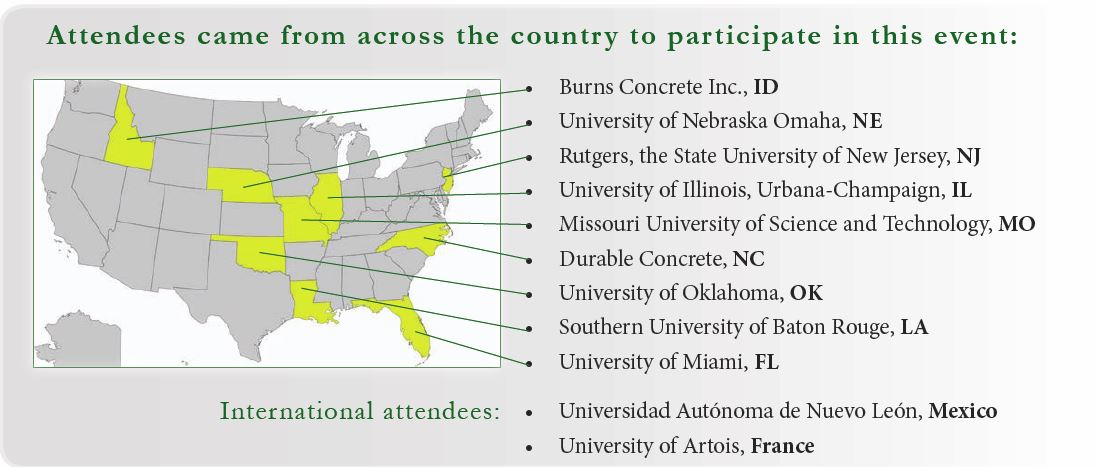Main menu
You are here
The RIME Group attended a special workshop at Missouri University
Date: 7/14/2014
Three RIME Group member (Adi Abu-Obeidah, Ph.D. Candidate, Dalexander Gonzalez and Zaina Hamdan, Undergraduate students) attended a special workshop at Missouri University for a 4-day accelerated short course on the fundamentals of rheology and applications on cement-based materials. The workshop offered participants classroom lectures and hands-on laboratory experiences, including an introduction to state-of-the-art rheometers. The workshop was led by three faculty members from the RE-CAST team, as indicated below. Students from the RE-CAST consortium universities attended the workshop, which allowed students working
on joint projects to meet face-to-face, as well as network with students from other universities across the country working on similar RE-CAST focus areas.

Click HERE to read more.
From July 14th to July 17th, 2014, Missouri University of Science and Technology hosted a Graduate Student Workshop for RE-CAST (Research on Concrete Applications for Sustainable Transportation). The four day course focused passionately on the fundamentals of Rheology and applications on cement based materials. The instructors of the prominent course were Dr. Kamal H. Khayat and Dr. Dimitri Feys from MS&T and Dr. David Lange from the University of Iowa. The workshop was consisted of attendees from several universities around the nations, most of which were Graduate and PhD students. The collaborative atmosphere constructed a very welcoming learning experience for the attendees, three of which were students from Rutgers. Adi Abu-Obeidah, Dalexander Gonzalez, and Zaina Hamdan were the students who attended the workshop and represented Rutgers University as well as Dr. Hani Nassif.
Before the start of the workshop MS&T offered the attendees the opportunity to tour the labs and equipment used in their research. The equipment ranged from table top rheometers to industrial sized mixers that were computer controlled. There were also advanced compression and tension machines. During the tour, the students were also introduced to different subjects of research and their importance in the engineering field.
The structure of the workshop consisted of lectures and lab work. The instructors put together informative presentations introducing, explaining and applying the fundamentals of Rheology. The importance of Rheology was continuously emphasized throughout the course.
There were two lab days. The first lab was to get the students familiar on how to determine the viscocity of an unknown liquid using a simple rheometer. Also, the relationship between rheology and thixotropy were used using ketchup with a more advanced rheometer. The second lab consisted of students mixing concrete, which consisted of three stages of adding more cementitious material or admixtures to show how the rheological properties changes with different mix designs. The concrete were tested using ASTM standards such as slump cone test, and V-funnel. Three different rheometers were used to determine rheological properties.
